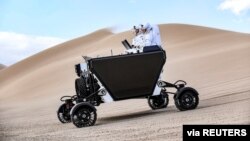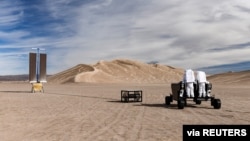An American company has presented a new space vehicle built to explore the moon.
California-based Venturi Astrolab uncovered its working model of the vehicle last week. The explorer, or rover, is called FLEX.
Astrolab officials say the four-wheeled rover was designed to be sent to the moon by the American space agency NASA. FLEX was developed to transport astronauts and cargo and support a series of lunar activities and experiments.
If NASA chooses to use the vehicle, it will become part of the Artemis program. That program aims to return humans to the moon as early as 2025. It also calls for establishing a long-term base on the moon that could one day launch astronauts to Mars.
FLEX could become the first astronaut-transporting vehicle to visit the moon since NASA’s Apollo 17 mission in 1972. Apollo 17 was the last of six American manned missions to the moon.
Retired Canadian astronaut Chris Hadfield recently test drove the vehicle. He said in a video released by Astrolab that rovers used during the Apollo missions were built purely for exploration purposes. But, Hadfield added, FLEX was designed to support astronauts landing on the moon for long-term stays.
“Once you get there, you’ve got to be able to move things around,” he said. “You also need to transition the equipment that keeps you alive and that enables the activities.”
Hadfield added: “When we settle somewhere, we don’t just need to get people from one place to another, but we need to move hardware, cargo, life support equipment and more."
Apollo 17’s rover set a moon speed record of 17.7 kilometers per hour. Astrolab chief Jaret Matthews says FLEX can move just as fast. He told Reuters such a speed is “kind of a practical limit for the moon," where gravity is one-sixth that of Earth. Matthews is a former rover engineer for NASA's Jet Propulsion Laboratory.
Vehicles designed for the Apollo missions operated with astronauts sitting and driving the vehicles like a car. With FLEX, astronauts stand in the back and control the vehicle with a joystick device.
The vehicle weighs about 500 kilograms, but can carry loads up to 1,500, Astrolab officials say.
With its sun-powered batteries fully charged, FLEX is designed to operate continuously for up to eight hours. Matthews said the vehicle’s energy storing system can survive the extreme cold of a lunar night and the rover can operate in total darkness.
Video of the test drive showed FLEX driving over sand and rocks in the California desert near Death Valley National Park. After the test, Hadfield said "it was huge fun” driving the vehicle.
I’m Bryan Lynn.
Reuters and Astrolab reported on this story. Bryan Lynn adapted the reports for VOA Learning English.
We want to hear from you. Write to us in the Comments section, and visit our Facebook page.
________________________________________________________________
Words in This Story
cargo – n. goods that are carried in a vehicle
manned mission – n. an important project or trip (especially space travel) that is carrying, staffed or performed by one or more people
transition – v. to change from one system or method to another
practical – adj. suitable or useful for a situation that may involve difficulty
joystick – n. a vertical handle used to control a computer game or piece of machinery
battery – n. a device that provides and stores electricity for certain electronic devices






